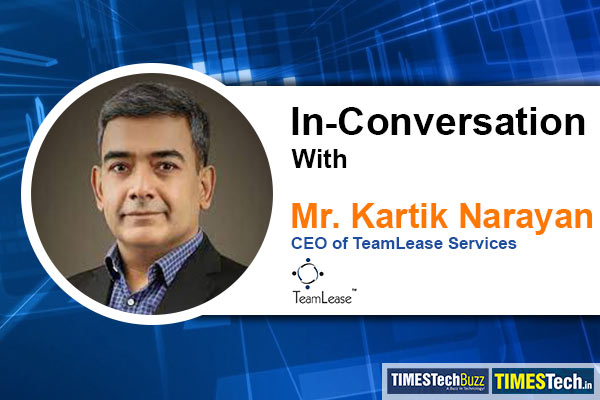Mr. Kartik Narayan, CEO of TeamLease Services, in a TimesTech interview, reveals the potential $500 billion AI and automation impact on India’s GDP by 2025. Narayan stresses the urgency for workforce transformation, addressing skill gaps and talent shortages, and explores strategies for upskilling 1.62 crore workers.
Read the full interview here:
TimesTech: What is the expected economic impact of AI and automation on India’s GDP by 2025, and how does it emphasize the urgency for workforce transformation?
Mr. Kartik: AI and automation are poised to inject $450-500 billion into India’s GDP by 2025, comprising 10% of our $5 trillion GDP goal. This underscores their potential to enhance economic growth, productivity, and competitiveness while ushering in new opportunities and challenges across sectors. Unleashing their full potential hinges on transforming India’s workforce to address skill gaps, talent shortages, and reskilling needs. A PwC report reveals that 54% of Indian employees recognize skill shortages, with 67% acknowledging the necessity for specialist training. Additionally, 71% express concerns about career advancement due to workplace dynamics. This highlights the imperative for workforce transformation, demanding collaboration and investment from employers, employees, and policymakers. Future-ready skills like analytical thinking, active learning, and emotional intelligence, alongside core competencies, are pivotal for navigating the evolving job landscape. Moreover, a human-centric approach to AI and automation ensures equitable benefits and support for all stakeholders, securing a thriving and inclusive workplace amid uncertainty.
TimesTech: With the need to upskill 1.62 crore workers in AI and automation, what are the challenges and opportunities associated with this significant workforce transformation in India?
Mr. Kartik: Upskilling 1.62 crore workers in AI and automation stands as a formidable yet indispensable endeavor for India to unlock the potential of these technologies and bridge the looming skill gap in the future of work.
Challenges:
- Limited access and affordability of quality education and training, particularly in rural and remote regions and among marginalized groups.
- Resistance among some workers towards embracing new technologies due to job insecurity or lack of awareness.
- The imperative for cohesive coordination among stakeholders to devise and execute inclusive upskilling strategies.
Opportunities:
- Creation of new job avenues and industries reliant on AI and automation skills.
- Enhancement of workforce quality and diversity through equitable learning opportunities.
- Cultivation of an innovation-driven culture, fostering creativity, problem-solving, and digital literacy among workers.
- The chance to bolster productivity and competitiveness across sectors and industries through skill augmentation initiatives.
TimesTech: Why is it essential for individuals to possess a combination of technical and soft skills in the evolving job market, and how does this contribute to success in the AI age?
Mr. Kartik: The job market is swiftly evolving due to the widespread adoption of AI and automation technologies, fundamentally altering work dynamics. Success in this landscape demands a blend of technical and soft skills that can effectively harness these innovations while upholding responsibility. Technical proficiencies like programming languages, data analysis, and machine learning are vital for comprehending and crafting AI systems and executing complex cognitive tasks. Equally essential are soft skills such as communication, creativity, problem-solving, and emotional intelligence, crucial for seamless collaboration between humans and machines and tasks requiring human judgment, empathy, and ethics. Integrating both technical and soft skills enhances individuals’ employability, competitiveness, and career pathways in the AI era, driving greater value and impact in their professional endeavors. This strategic combination equips individuals to navigate the complexities of the evolving work landscape with confidence and efficacy.
TimesTech: Can you provide examples of specific technical skills, such as automation and generative AI tools, and explain how they complement soft skills for a holistic approach to skill development?
Mr. Kartik: Automation epitomizes the utilization of technology to execute repetitive, rule-based, or error-prone tasks sans human intervention. Generative AI, a subset of AI, focuses on crafting original and innovative content like text, images, audio, or code, leveraging data and algorithms. These technical proficiencies elevate efficiency, accuracy, and productivity across diverse sectors like manufacturing, finance, and customer service.
However, mastery of these technical skills necessitates human oversight, collaboration, and problem-solving acumen vital for upholding quality, safety, and customer satisfaction. Consider a customer service representative utilizing automation tools to address routine inquiries; effective communication, empathy, and adept problem-solving are imperative for handling complex issues beyond automation’s purview. Similarly, while a content writer employs generative AI for text creation, critical evaluation of accuracy, coherence, tone, and ethical implications underscores the necessity of human judgment and ethical consideration. Striking a balance between technical prowess and soft skills ensures optimal outcomes in navigating the intricacies of modern workflows.
TimesTech: Considering the requirement for 4.7 million new jobs in the technology space by 2027, how does upskilling address the skill deficit in the existing IT workforce of 4.6 million professionals?
Mr. Kartik: Amidst the burgeoning demand for technology roles, set to escalate with an anticipated requirement of 4.7 million new positions by 2027, rectifying the skill gap among the existing IT workforce of 4.6 million professionals emerges as a critical imperative. Upskilling endeavors assume a central role in bridging this disparity, furnishing current IT professionals with requisite proficiencies to navigate evolving industry paradigms. By imparting training in emergent domains such as artificial intelligence, cloud computing, cybersecurity, and data analytics, upskilling initiatives ensure professionals remain pertinent and competitive amidst rapid transformations. These programs not only address skill deficits but also foster workforce retention, augment employee contentment, and fortify organizational resilience. Moreover, upskilling catalyzes innovation, propels economic expansion, and positions IT professionals as vanguards of digital transformation, facilitating the development of pioneering solutions and steering organizations toward digital maturity. Investments in upskilling empower companies to unlock the full potential of their workforce, mitigate skill shortages, and fulfill the escalating demand for technology talent, thereby safeguarding sustained triumph amid the dynamic tech industry landscape.
TimesTech: What strategies or programs are available for individuals to enhance soft skills like emotional intelligence, problem-solving, rapport-building, and leadership, to thrive in the AI age alongside technical proficiency?
Mr. Kartik: In the era defined by AI dominance, mastering a blend of technical prowess and soft skills emerges as pivotal for success in the digital realm. Diverse strategies and programs abound to aid individuals in augmenting essential soft skills like emotional intelligence, problem-solving, relationship-building, and leadership alongside their technical acumen.
Professional development avenues, ranging from workshops to online courses, laser-focused on emotional intelligence, facilitate effective emotion management, adept handling of interpersonal dynamics, and cultivation of robust workplace relationships. Problem-solving aptitude flourishes through experiential learning, case studies, and collaborative ventures, fostering critical thinking and innovative problem-solving.
Likewise, programs centered on relationship-building and communication empower individuals to foster trust, empathy, and effective communication both within teams and with external stakeholders. Leadership development initiatives equip individuals with vision-setting, strategic thinking, and team empowerment competencies, priming them to lead teams and navigate organizational shifts amidst the AI era.















